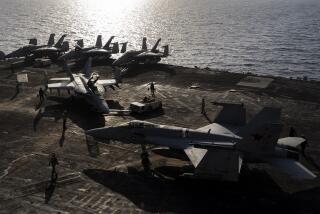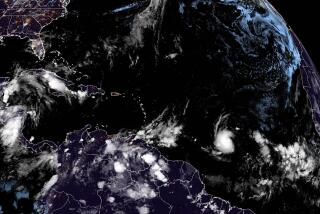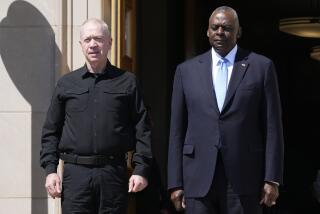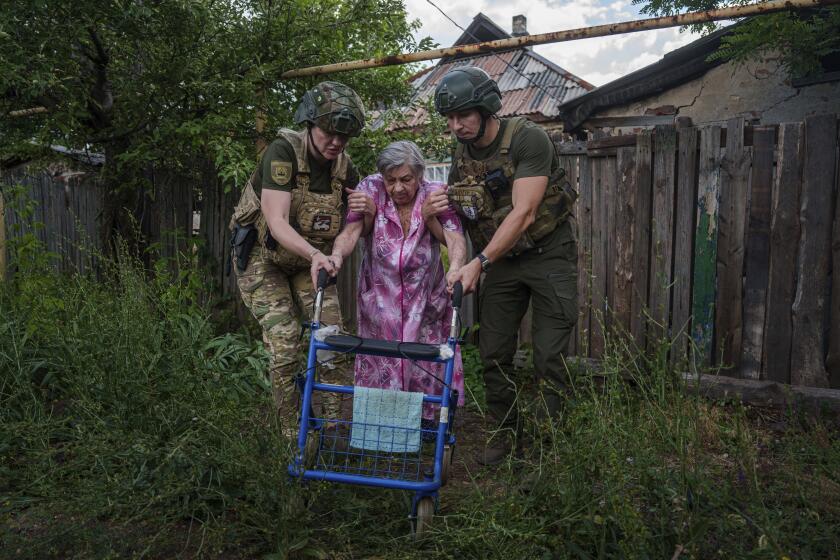Iran’s Nuclear Plans Worry U.S. Officials
If U.S. military officials are correct, Iraq’s nuclear facilities now lie in ruins, hopelessly damaged by a relentless barrage of American bombs and missiles. But that doesn’t eliminate the danger that a nuclear-armed nation may come to dominate the Persian Gulf.
Over the last few weeks, some Bush Administration officials and independent nuclear specialists here have grown increasingly worried about new signs that Iran may be starting down the same path as Iraq, its Persian Gulf rival, with secret efforts to buy nuclear technology and build nuclear weapons.
“It looks like there’s a really active program in Iran,” said Leonard S. Spector, a nuclear specialist at the Carnegie Endowment for International Peace. “It picked up over the past eight or 10 months, after they saw and read about what was going on in Iraq.”
Now, the Bush Administration and its allies are quietly launching a new international effort aimed at making it more difficult for such countries as Iraq and Iran to buy the high-tech items needed to develop nuclear weapons.
Representatives of the United States, its European allies and Japan plan to meet in The Hague a few weeks from now to work out new international restrictions on the export of so-called “dual-use” goods--items that, while they have other legitimate uses, are also important components for a program to develop nuclear weapons.
The objective is to find some way to keep Third World leaders from trying to develop nuclear weapons the way Iraq did and accomplish that goal short of going to war and trying to destroy such facilities with bombs and missiles.
The new international effort was prompted in part by the well-coordinated efforts of Saddam Hussein’s agents to secretly buy, piece by piece, many of the high-tech items needed to make weapons-grade nuclear fuel. These items included special steel, vacuum pumps and machinery used to enrich uranium in centrifuges.
“We saw Iraq finding ways to get through the loopholes in the system and buy centrifuge-enrichment technology,” one U.S. official said. “There were broad Iraqi efforts aimed at obtaining these dual-use items.”
Bush Administration officials acknowledge that moves to impose new international restrictions on high-tech exports are also prompted by a new phenomenon--an unintended side effect of the ending of the Cold War.
Last July, the United States, West European countries and Japan lifted many longstanding controls on the sale of high-tech goods to Eastern Europe. That inadvertently made it easier for countries such as Iraq, Iran and North Korea to buy, through East European intermediaries, many of the dual-use items needed for nuclear weapons.
“A country like Czechoslovakia has lots of other things on its mind,” said a congressional specialist on nuclear weapons proliferation. “Enforcing export controls is way down on their priority list right now.”
In the 1970s, during the reign of the shah, Iran had a fledgling nuclear program. But some of its top scientists left after the Islamic revolution, and two West German-supplied reactors installed at Bushehr on the Persian Gulf were damaged by Iraqi warplanes in 1987.
Until recently, analysts such as Spector believed that Iran’s nuclear research and development program was moving very slowly. Recently, these experts have begun to revise their estimates.
They note that some Iranian scientists seem to be conducting nuclear research at Tehran University and that another nuclear research and development program has opened in Isfahan.
“It’s fair to say that Iran’s scientists are conducting research on enrichment and reprocessing for nuclear weapons programs,” a State Department official concludes. “I wouldn’t be surprised if they also have agents in Europe scouring the market for the technology they need.”
In September, an Iranian News Agency report upbraided Germany for rebuffing Iran’s requests to help rebuild the Bushehr plant. Last week, a congressional investigator said he believes that a subsidiary or licensee of the German firm Siemens has just agreed to get the Bushehr nuclear reactors operating again.
Siemens officials deny the report. “That was something the Iranians may have considered, but we never considered it--not with a subsidiary, not with anyone else,” a Siemens spokesman asserted last week. He was unable to say for sure, however, whether or not some independent company that licenses Siemens’ nuclear technology might be arranging to rebuild Iran’s nuclear reactors.
Ayatollah Hashemi Rafsanjani, Iran’s president, tried two months ago to reassure the world that his country will abide by nuclear safeguards. “It will be impossible to control nuclear weapons if even a single country is equipped with such arms,” he said.
U.S. officials remain skeptical. “We’re concerned that the Iranians, in the future, will try to do what the Iraqis did, that is, set up a separate, secret nuclear enrichment facility not subject to international safeguards,” a Bush Administration official said.
Moreover, Gary Milhollin, director of the University of Wisconsin’s Project on Nuclear Arms Control, argues that even international safeguards cannot guarantee that a seemingly peaceful nuclear power plant won’t be used for a weapons program.
“The completion of the Bushehr plant would give them (Iran) a lot of plutonium,” Milhollin said. “The flaw in the system of international inspections is that they provide no safeguard in times of war. When a country is at war, no one would be allowed in to inspect the plant.”
Specialists on nuclear proliferation say that any nuclear threat from Iran would be years, perhaps a decade, away. “They’re doing basic research and development. From a technical standpoint, they’re very far away,” a State Department official said.
In fact, Iran’s nuclear development program is believed to be well behind those of some other would-be nuclear powers such as North Korea and Pakistan. The special fears about Iran stem not from how advanced the program is but from the country’s location alongside the Persian Gulf and its oil supplies.
Nuclear experts say that Pakistan was a pioneer in calculating how to obtain nuclear arms technology on a piecemeal basis. Pakistan’s example was followed by Iraq, and experts fear other countries may try to take the same route.
“During the 1970s, starting by bits and pieces, Pakistan bought the parts for a centrifuge to make enriched uranium,” one U.S. official said. “Since then, other countries have used Pakistan as a model, going the centrifuge route to obtain nuclear weapons.”
The United States has two ways to persuade other countries--such as France or Germany, for example--to clamp down on sales of high-tech items to potentially dangerous customers in such places as Pakistan, Iraq and Iran.
The first is simply to file a diplomatic protest, called a demarche. For example, the State Department can call in the German ambassador, tell him the United States has “reports” that a German company is about to sell an item that may be used for a nuclear program in Iraq or Iran and urge his country to hold up the sale.
This approach, however, has no teeth. Germany might be willing to ignore the American protest, or it might lack the ability or the will to stop a German company from exporting. One critic, a former Defense Department official, sarcastically dubs these State Department protests “demarche-mallows.”
The second method is to set up some multinational body to block sales of high-tech items. For years, the most important such organization has been the Coordinating Committee for Multinational Export Controls, or Cocom, a 17-nation group based in Paris that aims specifically at keeping advanced technology from the Soviet Union and its Warsaw Pact allies.
Cocom prepared lists of items that could not be sold without a license in what was then called the East Bloc. In some European countries, including Britain, Italy and Spain, these Cocom lists were written into law and became the legal basis for restricting exports.
Cocom lifted the curbs on sales of a range of high-tech items to Eastern Europe on July 1, 1990, in an avowed move to help new, non-Communist governments in the region.
The University of Wisconsin’s Milhollin says that “Cocom made these changes because German exporters, celebrating the end of the Cold War, demanded cuts in the control list.”
Among the items cleared for export were a number of dual-use items valuable for nuclear weapons programs, including krytons, which are nuclear weapons triggers. Such items are also not covered by the separate Nuclear Non-Proliferation Treaty, which restricts exports of only a few of the materials used directly to make fuel for nuclear bombs.
“When Cocom began to decontrol, we found that certain kinds of machine tools, certain kinds of oscilloscopes, that had been on the list should still be held up from export in order to stop the proliferation of nuclear weapons,” a State Department official said.
Yet without Cocom’s restrictions on East Bloc exports, there was no way to stop the exports. Cocom’s mission is to stem the flow of technology to Communist countries, and there is no comparable organization aimed at curbing the sale of dual-use goods to Third World countries like Iraq and Iran.
Since last fall, U.S. officials have been talking to European allies and Japan about ways to close this loophole. The result is the planned meeting in The Hague of countries that export dual-use technology that can be used to make nuclear weapons.
Similarly, the Bush Administration has been talking to European governments and Japan about adopting separate new limits on the export of high-tech products that can be used to manufacture chemical weapons, biological weapons and missiles.
Chastened by the speed with which foreign governments such as Iraq were acquiring nuclear technology, the Defense Department set up a special unit called the Proliferation Countermeasures Working Group. The group’s aim was to gather better intelligence about various countries’ nuclear weapons programs and come up with ideas for reducing the threat.
But the group’s chairman, Deputy Assistant Secretary of Defense Henry Sokolski, testified at a Senate committee hearing last October that his organization had stopped meeting after the invasion of Kuwait because its members were too busy with the immediate Iraq crisis.
“We were a consciousness-raising group, to point out the threats that the (U.S.) military would have to focus on,” Sokolski told Sen. John Glenn (D-Ohio). “We got overtaken by events, OK?”
Some experts now contend that the destruction of Iraq’s nuclear facilities may reduce the incentive for Iran to push its nuclear program.
“If Iraq ceases to be a problem, the urgency of Iran getting a countervailing (nuclear weapons) system would ease,” the Carnegie Endowment’s Spector said. “Iran would only have needed nuclear weapons to counter the threat from Iraq.”
Others are more pessimistic. Milhollin, for example, said that despite the U.S. bombing program, he does not yet believe that Iraq’s own potential for nuclear weapons is completely destroyed.
“If they can hide the Scuds from the American planes and missiles, then they can hide some centrifuges too,” Milhollin said.
More to Read
Start your day right
Sign up for Essential California for news, features and recommendations from the L.A. Times and beyond in your inbox six days a week.
You may occasionally receive promotional content from the Los Angeles Times.






